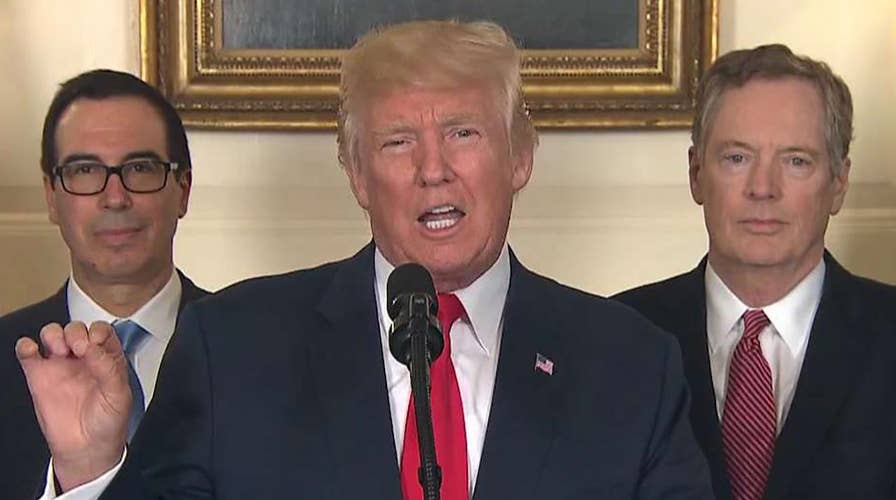Trump administration puts Broadcom bid for Qualcomm on hold
Federal government hits the pause button on foreign takeover that could jeopardize American leadership in a crucial wireless technology; Gillian Turner reports.
Singapore-based Broadcom’s attempt to acquire U.S. chipmaker Qualcomm poses a serious threat to U.S. national security, warn politicians, amid escalating tensions over the controversial takeover bid.
Broadcom’s proposed $117 billion deal for Qualcomm is attracting the attention of U.S. lawmakers. San Diego-based Qualcomm makes the Snapdragon chips used in smartphones and tablets.
With concerns about the acquisition attempt mounting, the Committee on Foreign Investment in the United States (CFIUS), has ordered Qualcomm to postpone its annual shareholders meeting and election of directors by 30 days. At the meeting, originally scheduled for Tuesday March 6, Qualcomm shareholders were set to vote on replacing six of the company’s 11 directors with Broadcom nominees, The Wall Street Journal reports.
“This measure will afford CFIUS the ability to investigate fully Broadcom’s proposed acquisition of Qualcomm,” explained a Treasury Department spokesperson, in a statement released Sunday.
WHY THE BID TO BUY QUALCOMM POSES A DIRE THREAT TO US NATIONAL SECURITY
CFIUS is an inter-agency organization that weighs the national security impact of foreign transactions on U.S. national security.
In a statement released Monday, Broadcom slammed Qualcomm, which it said had instigated the delay.
“Broadcom was informed on Sunday night that on January 29, 2018, Qualcomm secretly filed a voluntary request with CFIUS to initiate an investigation, resulting in a delay of Qualcomm's Annual Meeting 48 hours before it was to take place,” it said. “This was a blatant, desperate act by Qualcomm to entrench its incumbent board of directors and prevent its own stockholders from voting for Broadcom's independent director nominees.”
Qualcomm has not yet responded to a request for comment on this story from Fox News. Broadcom did not respond to request for additional comment from Fox News.
QUALCOMM EYES FUTURE FULL OF CONNECTED CARS AND SMART ROUTERS
Politicians have been voicing their concern about the national security implications of a tie-up between Qualcomm and Broadcom.
“Qualcomm’s acquisition by Broadcom at any price would damage American security and endanger the creative team of San Diegans who have made this company a technology jewel for the U.S,” wrote California Republican Rep. Duncan Hunter, in an op-ed for the San Diego Tribune that was published March 3.
“During World War II, it would have been unthinkable to allow foreign acquisition of America’s steel industry,” Hunter, who represents San Diego county, added. “In today’s precarious security environment, where adversaries like China are actively stealing technology and intellectual property, the high-speed communications industry is equally as important.”
California Democratic Rep. Scott Peters, who represents San Diego county as well, also penned an op-ed for the San Diego Tribune, noting that Qualcomm’s research into next-generation 5G wireless communication is critical to U.S. national security. The technology, he explained, is crucial to the U.S. military, NASA, and the country's energy grid. “[Qualcomm's] continued development of 5G wireless, artificial intelligence and other technologies that will underpin nearly every internet-connected device in the country, also makes Qualcomm a target for foreign intelligence agencies,” he added
In the column, published March 2, Peters explained that he has asked CFIUS to review the potential transaction.
Broadcom is planning to move its legal headquarters back to the U.S. this year, a process which it expects to complete no later than May 6. “Broadcom continues to pursue the redomiciliation process as expeditiously as possible,” it explained, in its statement released on Monday. “Upon completion of the redomiciliation, Broadcom's proposed acquisition of Qualcomm will not be a CFIUS covered transaction.”
The company added that it is "fully committed" to cooperating with CFIUS in any review, as it did during its successful acquisition of Brocade in 2017.
The Associated Press contributed to this article. Follow James Rogers on Twitter @jamesjrogers





















